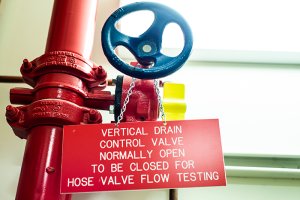ASHE provides answers to code questions
Those responsible for health care facility compliance understand that the many codes and standards regulating hospitals aren't always as clear-cut as they may seem. Code questions can arise from unclear code language, unaddressed issues in codes, conflicting code requirements or interpretations from authorities having jurisdiction.
The "Just Ask ASHE" service helps ASHE members receive reliable answers from code experts. This free service, available only to ASHE members, is used to find answers to a wide range of questions.
ASHE has a team of experts to answer such questions, says its senior advocacy analyst Lynn Kenney, who heads the service. The professionals answering questions are involved in committees, task forces and advisory groups for a variety of code-making organizations.
Because of this, the Just Ask ASHE team is uniquely positioned to provide information that considers the many viewpoints, codes and regulations that make up health care compliance. "Just Ask ASHE pulls all these experts together so that our members have a single source for reliable answers," Kenney says.
Two examples of recent questions and answers are:
Q: Many devices have UL warnings stating "household use only," but are there regulations prohibiting their use in hospital settings?
A: There is no formal code that disallows "household use only" items from being used in a hospital, although these items should be used as intended by the manufacturer and their use may not be appropriate for every condition, situation or space. To determine whether these items would be appropriate, the facility should have a policy and risk-assessment procedure to determine the use of such equipment within the facility. Surveyors then would verify that the facility is following its policy and risk assessment. Without a policy and risk-assessment procedure provided by the facility, the surveyor would have to make a personal determination on this issue.
Q: A Massachusetts hospital's community relations department wants to hang a quilt in an exit access corridor and suggests using a spray-on product to meet NFPA 701 specifications. Is this an acceptable solution?
A: A textile wall hanging is considered a decoration under the Life Safety Code. The 2000 edition of the code states that textiles loosely hanging must meet the 1999 edition of NFPA 701, Standard Methods of Fire Tests for Flame Propagation of Textiles and Films. If the spray-on material allows the quilt to meet Test 1 of NFPA 701, it would be allowed under the Life Safety Code. However, it is unclear how conformance to the test could be confirmed short of having the test performed. In Massachusetts, approval from the local fire department would be required and samples would be needed for testing. One possible solution would be encasing the quilt in a glass case that does not extend into the hallway or impede egress.
ASHE members can ask questions using the Just Ask ASHE website
(www.ashe.org/JustAskASHE), where the legal disclaimer is found, or by using the ASHE Listserv.
By Deanna Martin, communications manager for ASHE.
Important monographs available
ASHE makes important resources available to members. Following are two recently released monographs that can be accessed by ASHE members as free PDFs at www.ashe.org/resources/management_monographs.
• Life Safety Code Comparison. The 2012 edition of the National Fire Protection Association's Life Safety Code offers new design and compliance options for health care facilities that didn't exist in previous editions. This ASHE monograph provides an exhaustive list of the changes in the new edition and a detailed comparison with the 2000 and 2009 editions.
• Room Ventilation and Airborne Disease. This ASHE monograph examines research on how room ventilation affects airborne-disease transmission in health care facilities. Farhad Memarzadeh, Ph.D., PE, examines findings that consider the effects of air changes per hour on infection transmission.
Design guidelines available to industry through ASHE
The 2014 editions of the Facility Guidelines Institute's Guidelines for Design and Construction of Hospitals and Outpatient Facilities and the Guidelines for Design and Construction of Residential Health, Care, and Support Facilities can be purchased through ASHE at www.ASHEstore.com.




